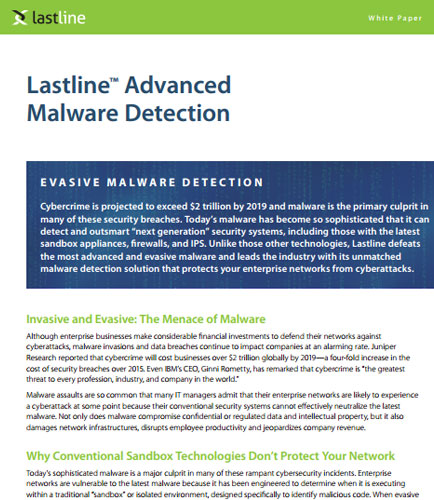
PROCESSING. PLEASE WAIT...

White Paper: Lastline
Today’s sophisticated malware is a major culprit in many of the rampant cybersecurity incidents. Unfortunately for organizations, advanced malware is getting harder to detect.
Malware assaults are so common that many IT managers admit that their enterprise networks are likely to experience a cyberattack at some point because their conventional security systems cannot effectively neutralize the latest malware.
Traditional malware detection technologies are unable to see what’s going on inside the operating system, or in the kernel that the operating system relies on.
In such scenario an advanced malware protection approach is required to enable deep content inspection of all objects and to detect even the most evasive malware.
Market overview on advanced malware: detection, protection, and remediation
Why conventional sandbox technologies don’t protect your network
Common evasion methods used by malware authors to avoid detection
Identifying particular domains that are known to send advanced malware
Choosing an advanced malware protection solution to prevent mass-distributed malware infections and detect legacy threats

By: Qualys [NASDAQ: QLYS]
Today, the cloud-based security services are expected to be a “new area of growth.” The adoption of cloud solutions is driven by the need to innovate, simplify and cut costs. Avoiding the cost and the complexity of traditional software is one of the reasons why cloud services has become a mainstream delivery method for security solutions. This whitepaper explains how you can use cloud-based security to protect your network and ensure compliance without breaking the bank. Key takeaways from this whitepaper: Why smaller organizations are vulnerable Common approaches to security are too expensive Cloud-based security is more affordable & effective Seizing other benefits of cloud-based security Continuous security and compliance solutions
By: I-Sprint Innovations
In the digital era, financial institutions need to meet and exceed the expectations of a new generation tech savvy users with digital broadband access to on-demand cloud-based services via a wide range of mobile devices. In order to earn customers’ trust and confidence in their digital channels, financial institutions will have to secure identity and manage cross-channel access while leveraging mobility and the cloud. This whitepaper provides insights on how financial institutions can secure identity and data in a hyper-connected world where the data center perimeter has blurred and the enterprise attack surface has radically expanded with increased cloud adoption and mobility. Case studies illustrating how financial institutions are implementing prudent steps to engage customers across multiple channels Ultimate aim of the omni-channel initiatives Emerging methods of authentication How to boost security and compliance while ensuring differentiated customer experience in omni-channel service delivery


 2026 All Rights Reserved | by: www.ciowhitepapersreview.com
2026 All Rights Reserved | by: www.ciowhitepapersreview.com